
Vodacom and MTN thought they’d unlocked the future—automated call centres, lower costs, faster service. But SARS just slid into the group chat with a twist: AI doesn’t mean tax-free.
South Africa’s tax authority is reportedly eyeing backdated levies on AI-operated customer service systems, arguing that virtual agents still generate local value and thus... should pay their dues. Welcome to the Robot Tax Wars.
Telcos have been boasting about AI-driven efficiencies for years—Vodacom alone slashed millions in costs thanks to automated bots handling everything from billing to complaints. But with SARS sniffing around, those savings may now boomerang as tax liabilities.
Investors weren’t amused. Vodacom and MTN stocks dipped, reflecting concern that long-term automation gains may face short-term revenue hits. And if SARS succeeds, a new tax precedent could spread across fintech, retail, and even health tech.
While no official framework exists (yet), insiders suggest that:
● “Economic presence” via bots may fall under taxable operations.
● Companies using AI at scale could be liable for “virtual payroll” equivalents.
● Historical use might trigger back taxes—a costly retroactive hit.
● Regulatory Unfolding: Will SARS draft AI-specific tax guidance, or will this remain a legal grey zone?
● Corporate Response: Will telcos lobby for exemptions or adjust AI deployment strategies?
● Sector Spillover: If AI gets taxed, sectors from banking to e-commerce could feel the knock-on.
Turns out, robots might be fast—but SARS is faster. As the digital economy evolves, tax law is sprinting to catch up—and South Africa could be one of the first to test where AI ends and accountability begins.
Disclaimer:
This content has been generated using AI technology and is intended for informational purposes only. While efforts have been made to ensure accuracy and relevance, this text should not be considered professional advice or an official statement. Always verify information from authoritative sources before making any decisions.
© 2025 BROKSTOCK SA (PTY) LTD.
BROKSTOCK SA (PTY) LTD is an authorised Financial Service Provider and is regulated by the South African Financial Sector Conduct Authority (FSP No.51404). BROKSTOCK SA (PTY) LTD Proprietary Limited trading as BROKSTOCK. BROKSTOCK SA (PTY) LTD t/a BROKSTOCK acts solely as an intermediary in terms of the FAIS Act, rendering only an intermediary service (i.e., no market making is conducted by BROKSTOCK SA (PTY) LTD t/a BROKSTOCK) in relation to derivative products (CFDs) offered by the liquidity providers. Therefore, BROKSTOCK SA (PTY) LTD t/a BROKSTOCK does not act as the principal or the counterparty to any of its transactions.
The materials on this website (the “Site”) are intended for informational purposes only. Use of and access to the Site and the information, materials, services, and other content available on or through the Site (“Content”) are subject to the laws of South Africa.
Risk notice Margin trading in financial instruments carries a high level of risk, and may not be suitable for all users. It is essential to understand that investing in financial instruments requires extensive knowledge and significant experience in the investment field, as well as an understanding of the nature and complexity of financial instruments, and the ability to determine the volume of investment and assess the associated risks. BROKSTOCK SA (PTY) LTD pays attention to the fact that quotes, charts and conversion rates, prices, analytic indicators and other data presented on this website may not correspond to quotes on trading platforms and are not necessarily real-time nor accurate. The delay of the data in relation to real-time is equal to 15 minutes but is not limited. This indicates that prices may differ from actual prices in the relevant market, and are not suitable for trading purposes. Before deciding to trade the products offered by BROKSTOCK SA (PTY) LTD, a user should carefully consider his objectives, financial position, needs and level of experience. The Content is for informational purposes only and it should not construe any such information or other material as legal, tax, investment, financial, or other advice. BROKSTOCK SA (PTY) LTD will not accept any liability for loss or damage as a result of reliance on the information contained within this Site including data, quotes, conversion rates, etc.
Third party content BROKSTOCK SA (PTY) LTD may provide materials produced by third parties or links to other websites. Such materials and websites are provided by third parties and are not under BROKSTOCK SA (PTY) LTD's direct control. In exchange for using the Site, the user agrees not to hold BROKSTOCK SA (PTY) LTD, its affiliates or any third party service provider liable for any possible claim for damages arising from any decision user makes based on information or other Content made available to the user through the Site.
Limitation of liability The user’s exclusive remedy for dissatisfaction with the Site and Content is to discontinue using the Site and Content. BROKSTOCK SA (PTY) LTD is not liable for any direct, indirect, incidental, consequential, special or punitive damages. Working with BROKSTOCK SA (PTY) LTD you are trading share CFDs. When trading CFDs on shares you do not own the underlying asset. Share CFDs are complex instruments and come with a high risk of losing money rapidly due to leverage. A high percentage of retail traders accounts lose money when trading CFDs with their provider. All rights reserved. Any use of Site materials without permission is prohibited.